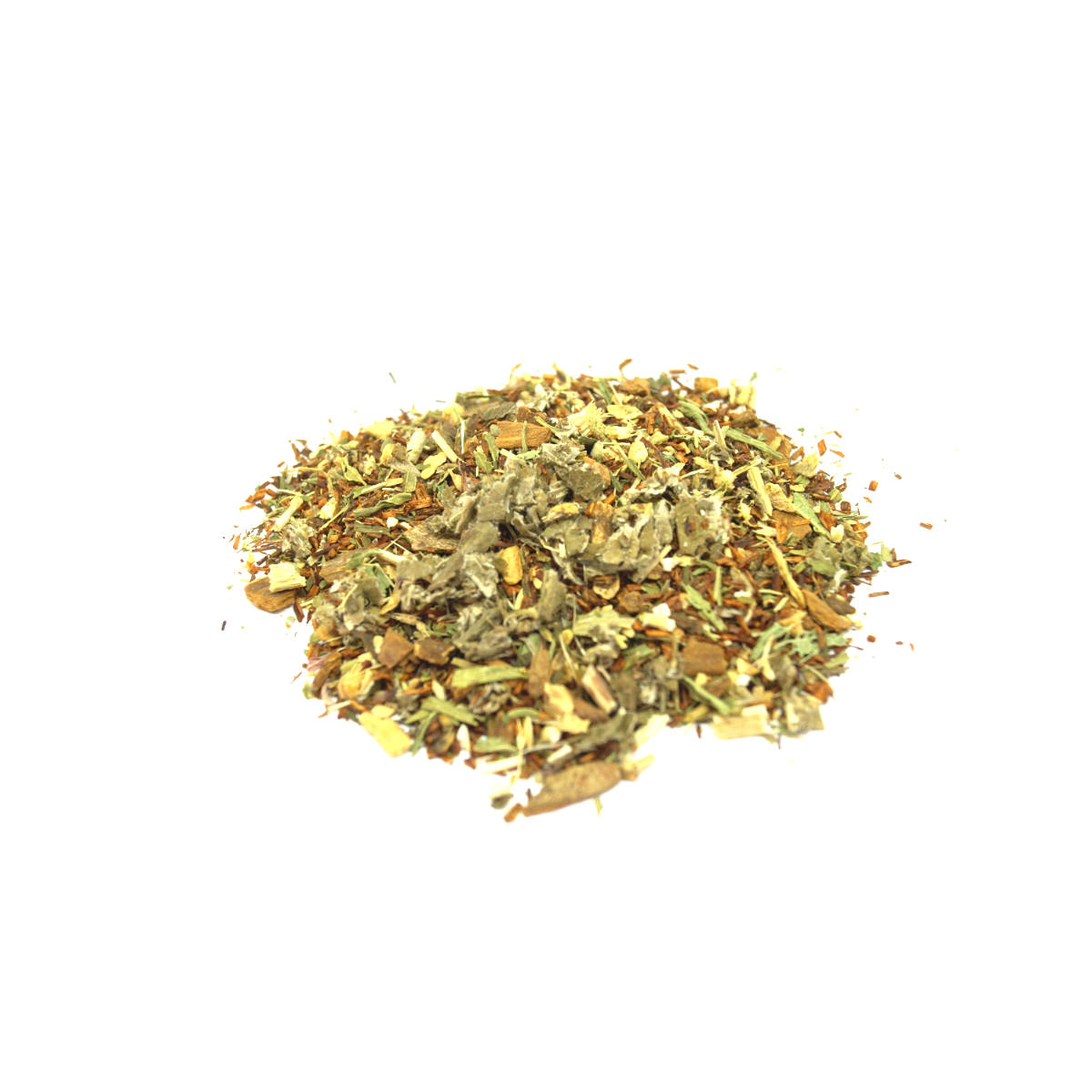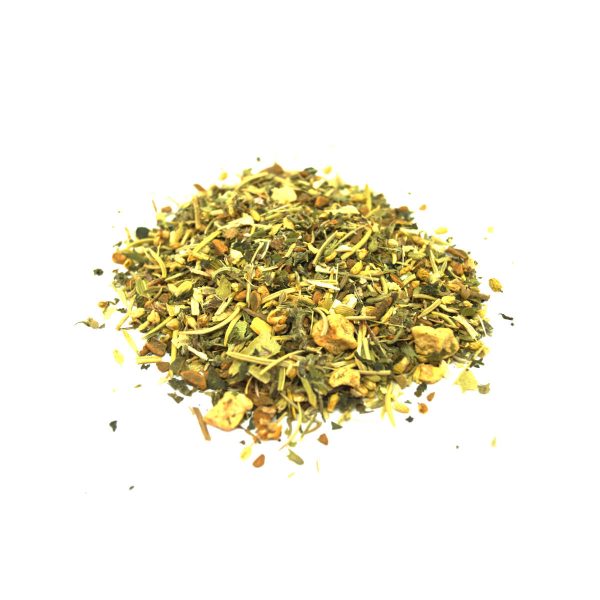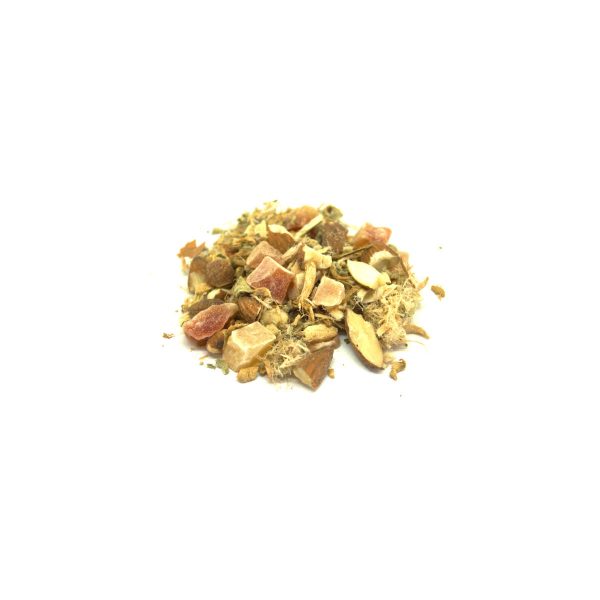Blender’s Notes Third Trimester:
Steep Me Self Help combinations are a wonderful way to get health benefits outside of the standard tea leaf. This combination of herbs helps them during the third trimester of pregnancy – helping the body start to prepare for the final delivery of the bundle of joy. This tea is to only be used during the last three months of pregnancy. These herbs are powerful and are meant to help the body prepare and can be a bit harsh for early pregnancy. We combined a great caffeine free Rooibos with Vanilla, adding in a bit of Cinnamon and Ginger giving it a gingerbread cookie taste.
The third trimester consists of the final three months of pregnancy — or from weeks 28 to 40 (or until delivery). A pregnancy consists of three trimesters which each consist of roughly 12 weeks. The final months of pregnancy can bring many physical and emotional challenges. It may be harder to get comfortable, and you may be balancing emotions like tiredness, excitement, and worry. The third trimester is also when many people begin childbirth or lactation classes, and make sure they have baby items like cribs, diapers, and clothing. The third trimester of pregnancy is all about growth and preparation — for both you and the fetus. Your uterus is going to grow to about the size of a watermelon by the time the third trimester ends. You can expect to feel new symptoms like shortness of breath and Braxton Hicks contractions. The fetus will gain weight more rapidly and its organs will mature to prepare it for birth. Most major health organizations agree that the third trimester of pregnancy starts on week 28. While there are slight variations depending on who you ask, most providers recognize 28 weeks as the start of the third trimester. The third trimester lasts until you give birth, which, on average, is weeks 39 or 40 of pregnancy. By the time you reach the last trimester of pregnancy, you may be feeling like a balloon that is ready to pop. While everyone experiences symptoms of pregnancy differently, the third trimester is when most people begin noticing aches and pains a little more. Your body is still growing, and it is preparing for labor and delivery — all at the same time. You may notice all or some of the following symptoms in the third trimester:
- Braxton Hicks contractions: Unlike true labor contractions that get stronger, more intense, and more painful over time, Braxton Hicks contractions are mild, irregular and do not progress. They can feel more like menstrual cramps. Moving positions or walking can relieve them. Also, be sure to drink plenty of water.
- Shortness of breath: It can be difficult to take deep breaths in the third trimester. This is mainly because your lungs do not have as much room to expand. This sometimes improves once the fetus drops down into your pelvis in preparation for birth (this is called lightening).
- Peeing more: When the fetus moves further into your pelvis, it can press on your bladder. This can lead to symptoms like peeing more often or leaking pee when you sneeze, cough, or laugh. Contact your provider if you think you are leaking amniotic fluid.
- Heartburn: Your growing uterus can press on your stomach and send stomach acids upward, causing symptoms like heartburn and indigestion.
- Swelling (edema): Fluid retention and weight gain can lead to swollen ankles and feet. Elevating your legs can help with the swelling.
- Varicose veins and hemorrhoids: An increase in blood volume can cause your veins to swell. This can cause spider veins on your arms or face or varicose veins on your thighs. Swollen veins in your rectum can cause you to develop hemorrhoids.
- Insomnia: Between the bathroom trips and discomfort from your belly, it can be hard to get quality sleep in the third trimester.
- Nesting: This is the strong urge to prepare your home (or life) for a baby. Some people say they experience a rush of energy that makes them want to clean and organize. It is also OK if you never feel a nesting instinct — some people do, and others do not.
Third Trimester of Pregnancy: Overview & When It Starts (clevelandclinic.org)
In this blend we included Ginger. Ginger has a warming, calming effect absolute top morning sickness saviors. Helps in maintaining cholesterol levels: Ginger is effective in regulating cholesterol levels during pregnancy. Adequate blood supply for your baby: By consuming ginger, the blood circulation in your body gets spiked up. This boosts the blood supply to the fetus as well. Helps you fight cough and cold: Your immune system becomes sluggish during pregnancy and makes you more susceptible to minor infections. Ginger is beneficial in boosting your immune system and helps you recover fast. Helps in relieving morning sickness: Ginger is effective in providing relief from nausea and morning sickness. You may take ginger in your tea or in the form of ginger ale to deal with tummy issues. Helps in absorption of nutrients: Consuming ginger may help your body to absorb nutrients from the food you consume by stimulating gastric and pancreatic enzymes, and in the same way, it may help the fetus as well. Keeps your blood sugar levels under check: Eating ginger during pregnancy not only wards off fatigue and exhaustion, but also helps you feel energetic. Numerous studies have proved that ginger is effective in keeping blood sugar at normal levels. Helps ease bloating: Taking ginger before bedtime helps in easing pregnancy-related indigestion, gas, and bloating. Effective in easing heartburns: Ginger aids in fighting the acids that cause heartburns during pregnancy. Next, we included Red Raspberry Leaf. Red Raspberry Leaf contains phytochemical compounds that are known to help tone the muscles in the pelvic area, including the walls of the uterus. This is important because it can help to make delivery easier. ramps up your B vitamin and vitamin C intake and packs considerable amounts of magnesium and potassium, which can help support your energy levels. While some studies show these leaves can support symptoms of PMS, for pregnant women in their second and third trimesters, a compound found in red raspberry leaves can maintain healthy pelvic muscles and the walls of the uterus, thereby supporting your delivery. Next, we added Dandelion. Dandelion encourages bile production in the liver and speeds up the elimination of waste. Dandelion is a gentle diuretic for pregnancy-related water retention. It can help fight fatigue, system sluggishness, and constipation, all common pregnancy issues. Dandelion is a high source of vitamin A, B, C, D, calcium, potassium, and iron, and is healthy and safe for moms-to-be. And finally, we added Echinacea. Echinacea is here to help support your immune system. will boost the immune system and ward off colds and other upper respiratory infections.
While there are no official recommendations, the doulas that we work with in both West Fargo/Fargo and Bismarck recommend starting with a cup a day around 30 weeks, then gradually increasing to three cups as you approach your due date. Potential benefits of regular consumption range from preventing pregnancy complications like pre-eclampsia and preterm labor to postpartum hemorrhage.
NOTE: “This/these claim(s) have/have not been evaluated by the Food and Drug Administration. This product is not intended to diagnose, treat, cure or prevent any disease.”
Features Third Trimester:
- Leaves can be infused all day! (They will not get bitter)
- Lots of individual flavor based on the ingredients
- All Wildcrafted Herbs
- All Organic where Wildcrafted is not available
- Sweet and Mild – Like a Cookie
- Light Colour Cup of Tea
- Full of natural antioxidants and Low in Tannins and Very Hydrating
- Sample Size ~ 1 oz will make 8-10 16 oz teas
- Sealed Bag ~ 4 oz will make 32-40 16 oz teas
- Iced Tea ~ Always Double the amount of Tea for the same size cup!
- Per Serving ~ 1 tsp per 6 oz of H2O
- Recommend 3 tsp Per Day – resteep leaves 2-3 times
- Caffeine: None
Ingredients: Steep Me Proprietary Organic and Wildcrafted Blend of Red Rooibos Tea from Cedarburg Province in South Africa with Ginger Root, Red Raspberry Leaf, Dandelion and Echinacea
Alternatively, try our Uterine Health ~ Pregnancy Nutrition Phyto~Nutrition Tea OR Prenatal to Lactation Micro~Nutrition Capsules OR Baby Delivery Aid Phyto~Nutrition Capsules OR Berry Plush Tea
Safe for Pregnancy – Especially Third Trimester
NOTE: This/these claim(s) have/have not been evaluated by the Food and Drug Administration. The products offered by Steep Me Tea Apothecary -Franchisees – Wholesalers – Influencers or SteepMe.com are not intended to treat, cure, or prevent any illness or disease. If you have or suspect that you have a medical problem, consult with your physician for diagnosis or treatment. All gender specific blends are based on Gender Assigned at Birth. Use herbs as per instructions and always watch for any allergic reactions. You should always carefully read all product packaging and labels. Always consult your physician or health care provider before using any herbal products, especially if you have a medical problem. Steep Me Tea Apothecary and SteepMe.com and/or its proprietors assume no liability for any injury, illness or adverse effects caused by the misuse and/or use of the information or products presented
NOTE: When using Teas, Capsules, Tinctures and Micro-Nutrition to help with your ailment ~ please remember this is a marathon ~ we recommend an investment of time of at least 6 months to see positive change. Any gender specific blends are based on gender assigned at birth.




